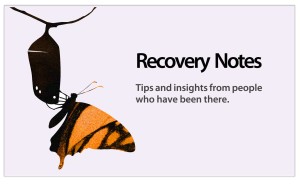
Five things I’ve learned about surviving my darkest struggles
Recovery Note #3
~ Taimi Allan
1. De-claw the Bear
Talking about the most difficult stuff (the unwanted thoughts, the frightening images, fears, guilt and panic) takes their power away. These things are waking nightmares designed by my brain to purge the rubbish and if I don’t find a way to let them out and dispose of them they become a self-destruct mechanism. Speaking them aloud to someone empathetic and non-judgmental I can trust helps me to challenge their hold on me, come up with more balanced perspectives and talk through cause and solution.
2. Look for physical and environmental causes
Sure there are some moments where my distress/depression/mania/psychosis is an equal and opposite reaction to an external, significant, negative event; those moments are really tough and life feels very unfair. The upside of horrible things happening to me though is that it’s easy to see why my brain is in meltdown, and get support and empathy from others. Sometimes, however, it just hits me like a sledge hammer from seemingly out of the blue. In these times my experience tells me there is usually a physical cause, maybe my hormones have gone haywire, I’ve developed a food allergy, eaten unhealthily for too long (or not eaten at all) or typically, I’ve not had enough sleep. I know now that if I address the physical stuff, nurture my temple then my mental health follows.
3. Avoid the Sirens-song of Substances
We all know the myths of sailors lured by beautiful Siren song only to become shipwrecked on the rocks. It is very easy in my darkest moments to reach out for the easiest means of escape. “Self medication” for me nowadays is junk food and wine. In my darkest moments it is tempting to use them, or something more destructive as a quick way of blocking out, avoiding or putting off dealing with what’s really going on. I learned the hard way that even taking a single step in this direction when I’m unwell is bad, bad news. As difficult as it is, I need to remove the temptation completely from my home, my friendships and my life until the moment has passed and I feel in control enough to simply eat respectfully and drink in moderation.
4. Observe moments of choice
Mental distress is like a pot-bellied stove, it gets stronger by feeding on every little piece of negativity and fear and yet it is warm and inviting. It is easy to fall into the comfort of distress, it sounds contradictory but life IS unfair and horrible so sometimes the only thing I really want to do is escape under the bed-covers, take a respite from responsibility and shut out the world. In every single millisecond however I know I have a choice to turn that around. I forgive myself for needing a moment to wallow, then as soon as I notice the moment that don’t have to punish myself or anyone else, I make the conscious choice to do something different.
5. Take responsibility
Here’s the truth as I see it for me; it is not the rest of the world, the people around me, services, doctors or pharmaceuticals job to ‘cure’ or ‘fix’ me. They are helpful aides when I need support, but without my buy-in, they actually don’t have much effect. In fact, if I blame anyone or anything outside of myself I know the situation very quickly deteriorates. That doesn’t mean I need to blame myself, but adopting a radical acceptance of the situation I’ve found myself in and a willingness to do everything I can to improve it gives me back some semblance of control. It’s fair to say that when I’m at my worst, I feel completely out of control, so this step towards autonomy is imperative to becoming whole again.
~ Taimi Allan
_ _ _ _
About the author: Taimi Allan has worked as a mental health consultant since 2009. She is most well known in the field for innovative and engaging health promotion strategies that challenge attitudes, inspire creativity and entertain audiences.
Recovery Notes is an Engage Aotearoa project that asks people to share the top five tips and insights they have learned from or about their personal experiences of mental-health recovery or being a supporter.
_ _ _ _
Copyright (c) Engage Aotearoa, 2014






